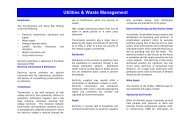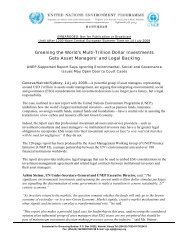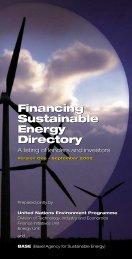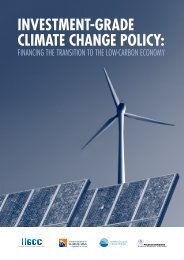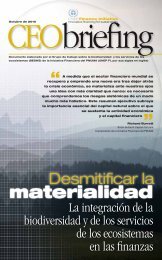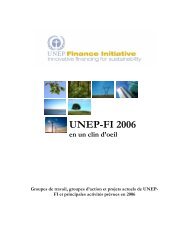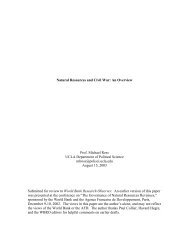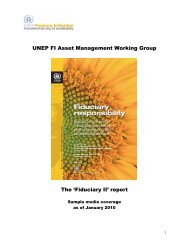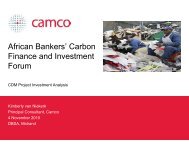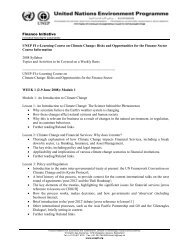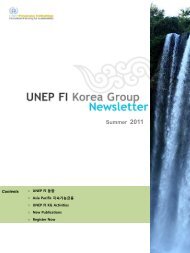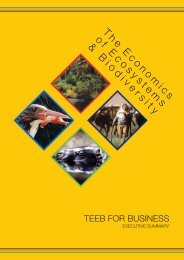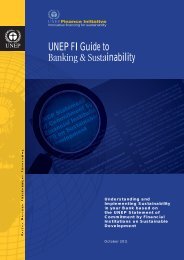UNEP FI 2008 Overview - UNEP Finance Initiative
UNEP FI 2008 Overview - UNEP Finance Initiative
UNEP FI 2008 Overview - UNEP Finance Initiative
Create successful ePaper yourself
Turn your PDF publications into a flip-book with our unique Google optimized e-Paper software.
<strong>UNEP</strong> <strong>FI</strong><br />
<strong>2008</strong> <strong>Overview</strong><br />
Change will not come if we wait for some other<br />
person or some other time.<br />
We are the ones we’ve been waiting for.<br />
We are the change that we seek.<br />
Barack Obama
<strong>2008</strong> <strong>UNEP</strong> <strong>FI</strong> events &<br />
meetings at a glance<br />
January<br />
■■Implementation workshops for PRI<br />
Signatories in South Africa, Cape<br />
Town and Johannesburg, South Africa<br />
March<br />
■■Symphony of the Earth: Giving the<br />
Earth a Voice, Geneva, Switzerland<br />
April<br />
■■ATF Online Training Course on<br />
Environmental and Social Risk<br />
Analysis<br />
May<br />
■■Integrating Biodiversity into Investment<br />
Decisions (CBD COP 9), Bonn,<br />
Germany<br />
■■West African Outreach Event, Lagos,<br />
Nigeria<br />
■■Implementation & recruitment events<br />
for PRI Signatories in Brazil, Sao Paolo<br />
and Rio, Brazil<br />
June<br />
■■Changing Landscapes: Towards a<br />
Sustainable Economy in Asia, Seoul,<br />
Korea<br />
■■Launch of the CEO Briefing on Human<br />
Rights and <strong>Finance</strong> at the Sustainable<br />
<strong>Finance</strong> Summit, Brussels, Belgium<br />
July<br />
■■ATF Online Training Course on<br />
Environmental and Social Risk<br />
Analysis<br />
August<br />
■■Becoming Bankable: Experiences and<br />
Challenges in Market-Based <strong>Finance</strong><br />
in the Water Sector, Stockholm,<br />
Sweden.<br />
September<br />
■■6th International Responsible<br />
Investment Conference, Melbourne,<br />
Australia<br />
■■Bringing the Universal Owner<br />
Rationale to Life: All you Need is<br />
Water, London, UK.<br />
October<br />
■■Valuing Natural Capital: Overcoming<br />
Barriers to Market Valuation of<br />
Biodiversity & Ecosystem Services,<br />
Barcelona, Spain<br />
■■Launch of the Revised Online Human<br />
Rights Guidance Tool<br />
■■UN Global Compact Human Rights<br />
Working Group (HRWG) Meeting,<br />
Bonn, Germany<br />
■■Addressing ESG Inefficiencies of the<br />
Capital Markets, Vienna<br />
November<br />
■■The Role of <strong>Finance</strong> & Insurance in<br />
Climate Change, Tokyo, Japan<br />
■■Towards a Sustainable Society: The<br />
Roles expected of Corporations and<br />
Investors, Tokyo, Japan<br />
■■<strong>2008</strong> SRI Seminar: CSR Disclosure<br />
and Effect on Corporate Valuation,<br />
Tokyo, Japan<br />
■■Bringing the Universal Owner<br />
Rationale to Life: All you Need is<br />
Water, Melbourne, Australia<br />
■■Addressing ESG Inefficiencies of the<br />
Capital Markets, Johannesburg<br />
■■The Policy Context for Responsible<br />
Investment workshop, Geneva,<br />
Switzerland<br />
December<br />
■■Making Forests Competitive: Practical<br />
Solutions for Permanence event,<br />
Poznan, Poland<br />
<strong>UNEP</strong> <strong>FI</strong> in <strong>2008</strong><br />
Foreword<br />
A roller coaster ride<br />
brings new opportunity<br />
<strong>2008</strong> was a roller coaster of a ride for the financial community, but it also marked<br />
an unprecedented opportunity for <strong>UNEP</strong> <strong>FI</strong> to get its message across. Consequently<br />
we have worked throughout the year to ensure that the embedding of sustainable<br />
finance, responsible investment and green business principles takes priority in the<br />
global response to the financial crisis and to advocate for corporate responsibility in<br />
all economic, financial and investment activity.<br />
Alongside, and parallel to, the financial crisis has been our concern with climate<br />
change and the growing realization that less than a year remains before a new<br />
agreement must be reached to replace the Kyoto Protocol. <strong>UNEP</strong> <strong>FI</strong> must become<br />
increasingly bold in its advocacy and more proactive in its activities to drive home the<br />
climate change message. In this respect our input to December’s UNFCCC meeting in<br />
Poznan, Poland has been a good start.<br />
Our entry into the post-credit crunch era, when it comes, also marks a chance for<br />
the finance and investment community to truly integrate environmental, social and<br />
governance issues into corporate business policies and business practices. Some of<br />
<strong>UNEP</strong> <strong>FI</strong>’s <strong>2008</strong> activities – I would single out our contributions to the June Special<br />
Session of the UN General Assembly – will, I hope, provide invaluable input to this<br />
process.<br />
The partnership was quick off the starting block in <strong>2008</strong>. In February we were invited<br />
to participate in a meeting co-convened by the OECD and the World Economic Forum.<br />
A few weeks earlier our voice had been heard at the Global Environment Ministerial<br />
Forum in the Principality of Monaco. At this meeting <strong>UNEP</strong> <strong>FI</strong> convened a roundtable<br />
and our Chair, Rob Tacon, from Standard Chartered Bank, joined a panel that<br />
presented to government ministers.<br />
Many quality reports were produced in <strong>2008</strong> and it is hard to single one out. However<br />
it is particularly pleasing that Bloom or Bust which examines the relationship<br />
between financial services and biodiversity and ecosystem services, came immediately<br />
ahead of the May UN Convention on Biological Diversity COP meeting in Bonn<br />
and, along with our half-day event at that gathering, helped reinforce the call for<br />
responsible, sustainable development of new markets based on natural value.<br />
Our work this year has not gone without recognition. <strong>UNEP</strong> <strong>FI</strong> received an award at<br />
the Triple Bottom Line Investing (TBLI) conference in Amsterdam and the magazine<br />
Investment & Pensions Europe (IPE) recognized the partnership for its “Outstanding<br />
Contribution to the Development of Environmental, Social and Governance (ESG)<br />
Investing”.<br />
The uncertainty that looms over the financial world will doubtless carry though into<br />
2009. Market volatility will certainly continue – even the most expert commentators<br />
cannot predict what’s coming next. However, whatever may come, however severe the<br />
downturn may be, <strong>UNEP</strong> <strong>FI</strong> will enter the year in a strong position, with a growing<br />
base of influential and committed Signatories, ready to continue its drive to make sure<br />
that financial flows into effective development do not suffer.<br />
Paul Clements-Hunt<br />
Head of Unit<br />
<strong>UNEP</strong> <strong>Finance</strong> <strong>Initiative</strong>
for human rights around the world. No one denies that<br />
the activities of business help provide the enabling<br />
environment needed for the enjoyment of human rights.<br />
At the same time, it is clear that company operations can<br />
have serious negative impacts on the protection of human<br />
rights when not carried out in a responsible manner.<br />
More and more business leaders from the global north<br />
and south are showing that they are ready to take on<br />
their appropriate role in promoting and protecting human<br />
rights and a growing number of leading companies<br />
are committed to using a human rights framework to<br />
help shape more principled and profitable corporate<br />
performance. Progress is being made in the areas of<br />
human rights impact assessments and in the production<br />
of guidance and tools for business to use in managing<br />
human rights risks. The <strong>UNEP</strong> <strong>Finance</strong> <strong>Initiative</strong> is at the<br />
leading edge of these developments among business<br />
sectors.”<br />
Mary Robinson,<br />
<br />
A Document of the <strong>UNEP</strong> <strong>Finance</strong> <strong>Initiative</strong><br />
Sustainability Management and Reporting Project<br />
December 2006<br />
And in<br />
2009…<br />
Two burning questions seem set to<br />
dominate sustainable finance in<br />
the coming year -– how can we, as<br />
<strong>UNEP</strong> <strong>FI</strong> Signatories, accelerate the<br />
mainstreaming of environmental,<br />
social and governance issues into<br />
the process of rebuilding trust and<br />
reputations that all banks and financial<br />
institutions must now undertake; and,<br />
how can our expert opinion be best<br />
used to ensure that the negotiators,<br />
now looking for a post-Kyoto climate<br />
change agreement, overcome national<br />
and sectorial differences and secure the<br />
best possible deal for the planet and<br />
its people, particularly those living in<br />
persistent poverty?<br />
Neither question is easy to answer<br />
and, while public concern over the<br />
credit crunch and the threat of global<br />
warming has certainly brought these<br />
questions to the fore, much hard<br />
work needs to be undertaken in the<br />
coming year to keep them a focus of<br />
public debate, a topic for boardroom<br />
discussion and, above all, high on the<br />
international agenda.<br />
As <strong>UNEP</strong> <strong>FI</strong> Signatories we must<br />
never forget our commitment to<br />
sustainability and development and<br />
our duty, not only to our shareholders<br />
and investors, but to the millions upon<br />
millions of poor people and future<br />
generations whose survival, let alone<br />
happiness, depends on our efforts in<br />
this coming year.<br />
Rob Tacon<br />
<strong>UNEP</strong> <strong>FI</strong> Chair<br />
Facts & Figures <strong>2008</strong><br />
Funding<br />
<strong>UNEP</strong> <strong>FI</strong> 2007 INCOME US$ ’000<br />
Core Income<br />
Signatory contributions 1,665<br />
<strong>UNEP</strong> funds 150<br />
Total Core Income 1,815<br />
Sponsorship & Miscellaneous Funds 140<br />
Total Income 1,955<br />
Signatories to the <strong>UNEP</strong> <strong>FI</strong> Statements<br />
<strong>UNEP</strong> <strong>FI</strong> welcomed 13 new members in <strong>2008</strong>, with a total membership of 177 Signatories at the<br />
end of the year.<br />
Geographical Breakdown<br />
Europe 49%<br />
Asia Pacific 28%<br />
North America 13% 13%<br />
Latin America 6%<br />
Africa 3%<br />
Middle East 1%<br />
Sectoral Breakdown<br />
Banking 59%<br />
Insurance 18%<br />
Others (Asset Managers,<br />
Pension Funds, etc.) 23%<br />
18%<br />
6%<br />
28%<br />
23%<br />
1%<br />
3%<br />
49%<br />
59%<br />
<strong>2008</strong> research & publications at a glance<br />
CEO Briefings<br />
■■CEO Briefing on Human Rights<br />
Reports<br />
■■GRI Financial Services Sector<br />
Supplement<br />
■■Responsible Property Investing:<br />
What the leaders are doing<br />
(English, Japanese)<br />
■■Building Responsible Property<br />
Portfolios (English, Japanese)<br />
■■Innovative financing for<br />
sustainable small and medium<br />
enterprises in Africa<br />
■■Narrowing the gap: A survey of the<br />
barriers and drivers to commercial<br />
microfinance in Africa<br />
■■Biodiversity and Ecosystem<br />
Services: Bloom or Bust?<br />
■■Making Forests Competitive:<br />
Exploring insurance solutions for<br />
permanence (Concept Paper)<br />
Newsletters<br />
■■Australasian <strong>UNEP</strong> <strong>Finance</strong> <strong>Initiative</strong><br />
Newsletter, Issue 15<br />
■■Australasian <strong>UNEP</strong> <strong>Finance</strong> <strong>Initiative</strong><br />
Newsletter, Issue 14<br />
CEObriefing<br />
H U M A N<br />
R I G H T S<br />
here is growing agreement that the private<br />
“Tsector should do its part to help ensure respect<br />
<br />
Sustainability<br />
Management and<br />
Reporting<br />
Benefits for Financial Institutions in<br />
Developing and EmergingN Economies a r r o w i n g<br />
t h e g a p<br />
A survey of the barriers and drivers<br />
to commercial microfinance in Africa
Work Streams<br />
A report by the<br />
Asset Management Working Group<br />
of the United Nations Environment Programme<br />
<strong>Finance</strong> <strong>Initiative</strong><br />
A follow up to the AMWG’s 2005<br />
‘Freshfields Report’<br />
July 2009<br />
John Coomber Chief Executive Officer<br />
Swiss Re<br />
The designations employed and the presentations of the material in this publication do not imply the expression of any<br />
opinion whatsoever on the part of the United Nations Environment Programme (<strong>UNEP</strong>), the United Nations Environment<br />
Programme <strong>Finance</strong> <strong>Initiative</strong> (<strong>UNEP</strong> <strong>FI</strong>), or any of its member organisations, concerning the legal status of any country,<br />
territory, city or area of its authorities, or concerning the delimitation of its frontiers or boundaries. Moreover, the views<br />
expressed do not necessarily represent the decisions or the stated policy of <strong>UNEP</strong>, <strong>UNEP</strong> <strong>FI</strong> or any of the contributing<br />
member organisations of <strong>UNEP</strong> <strong>FI</strong>. The citing of trade names or commercial processes does not constitute endorsement.<br />
Innovative financing for sustainability<br />
<strong>UNEP</strong> <strong>FI</strong>’s strategic work programme is focused on current and emerging issues which are relevant to<br />
its members. <strong>UNEP</strong> <strong>FI</strong>’s sector-based and theme-specific work streams provide a forum to Signatory<br />
institutions to work collaboratively on finding innovative approaches to managing these issues.<br />
Asset Management Working<br />
Group (AMWG)<br />
Fiduciary<br />
Responsibility<br />
and ESG<br />
Issues<br />
Fiduciary A follow-up<br />
responsibility report is being<br />
Legal and practical aspects prepared<br />
of integrating environmental,<br />
social and governance issues<br />
into institutional investment to A Legal<br />
Framework<br />
for the<br />
Integration of<br />
ESG Issues Into<br />
U N E P<br />
Institutional Investment – produced in<br />
2005 for the AMWG by the international<br />
law firm, Freshfields Bruckhaus Deringer,<br />
and arguably the single most effective<br />
document for promoting the integration of<br />
environmental, social and governance (ESG)<br />
issues into institutional investment<br />
This sequel report – Fiduciary<br />
Responsibility: Theoretical, Practical and<br />
Legal Aspects of Integrating ESG Issues Into<br />
Institutional Investment – will be launched<br />
in 2009 and is expected to be another<br />
powerful agent of systemic change that will<br />
further mainstream the integration of ESG<br />
issues into the investment process.<br />
Consequently, the AMWG initiated a multiyear,<br />
multi-faceted study encompassing the<br />
state of the art on fiduciary duty and ESG<br />
issues; how asset owners can integrate of<br />
ESG issues into their mandates; best practices<br />
from asset managers and investment<br />
consultants and their duties to their<br />
principals with respect to ESG issues; and to<br />
explore specific failures, misalignments and<br />
conflicts of interest within the system.<br />
Achievements<br />
<strong>UNEP</strong> <strong>FI</strong> Climate Change<br />
Working Group members<br />
Capital Markets and the Valuation<br />
■ Active participation at UNFCCC Conferences of the Parties<br />
Olivia Lister<br />
Colin Le Duc<br />
(COPs). The CCWG is moving towards greater cooperation with Environmental Risk Manager<br />
the UNFCCC Secretariat, ensuring the financial sector perspective Abbey<br />
Management<br />
of ESG Factorsis integrated into the broader intergovernmental negotiations.<br />
Tel +44 1908 348 419<br />
olivia.lister@abbeynational.co.uk<br />
■ Production of a series of business-relevant opinion papers<br />
providing insight into the risks and opportunities of climate<br />
Iris Gold<br />
Mark Way<br />
change from a financial institution perspective.<br />
The AMWG, in partnership with the<br />
Vice President<br />
Citigroup<br />
Management<br />
■ Sustainable Energy <strong>Finance</strong> <strong>Initiative</strong> (SE<strong>FI</strong>) launched October Tel +1 212 816 6677<br />
Swiss Re<br />
2003. A partnership between <strong>UNEP</strong> <strong>FI</strong>, <strong>UNEP</strong> Energy and the<br />
iris.gold@citigroup.com<br />
Basel Agency for Sustainable Energy (BASE), aiming to provide<br />
World Business Council<br />
financiers with the tools, support<br />
for<br />
and networks to<br />
Sustainable<br />
drive financial Armin Sandhövel<br />
innovation that improves environmental performance of the<br />
Head Corporate Sustainability<br />
energy mix.<br />
Dresdner Bank AG<br />
Tel +49 69/2635 5193<br />
Development, conducted<br />
■ Release of 2002 Landmark Study, “Climate pioneering<br />
Change and the<br />
armin.sandhoevel<br />
pch@unep.ch<br />
Financial Services Industry”, highlighting the need for long-term, @dresdner-bank.com<br />
market-based frameworks to foster financial sector participation.<br />
Advisors<br />
Stating: ‘The Kyoto Protocol is an important step but does not go Dirk P. Kohler<br />
global workshops nearly on far enough’. ESG factors Managing and Director<br />
GSDP Global Sustainable<br />
■ Collaboration with the Carbon Disclosure Project (CDP) bringing Development Project S.A.R.L.<br />
about a transformation in the quality of data available to investors Tel +33 4 96 11 68 21<br />
company valuation the corporate in implications <strong>2008</strong>. of climate change. The aims<br />
gsdp@gsdp.fr<br />
Julian Salt<br />
For more information on the <strong>UNEP</strong> <strong>FI</strong> Climate Change Working Group: Thomas Loster<br />
http://unepfi.net/cc<br />
Head<br />
of the workshops, which spanned Weather/Climate Africa,<br />
Risks Research<br />
“Swiss Re is fully aware of the great challenges arising from global Munich Re<br />
Kirsty Hamilton<br />
climate change. We not only seek to be at the forefront of creating Tel +49 89/3891 5287<br />
Policy Consultant<br />
and working on developing a marketplace for sustainable assets<br />
tloster@munichre.com<br />
Asia, Europe through North our Greenhouse Gas Risk Solutions America, team, but clearly were to<br />
believe that we should operate and manage our own operations<br />
according to the highest sustainability criteria.”<br />
develop a common view on ESG value, to<br />
understand current gaps in communicating<br />
ESG information, to improve the integration<br />
of ESG factors into company valuation,<br />
and to accelerate progress on sustainable<br />
development, A practical field guide<br />
document for investors and companies will<br />
be published in 2009.<br />
SAM Sustainable Asset<br />
Tel +41 1 397 1010<br />
colin@sam-group.com<br />
Group Sustainability<br />
Co-Chairs: Calvert Group Ltd (USA), HSBC Global<br />
Asset Management<br />
Members: Acuity Investment Management<br />
(Canada), AIG Investments (US), Aviva Investors<br />
(UK). Banco Real (Santander Asset Management)<br />
(Brazil), BNP Paribas Asset Management (France),<br />
Calvert Group (US), ClearBridge Advisors (US),<br />
Eurizon Capital<br />
(Intesa Sanpaolo Group) (Italy), Groupama Asset<br />
Management (France), Henderson Global Investors<br />
(UK), Hermes Pensions Management (UK), HSBC<br />
Global Asset Management (France), Mitsubishi UFJ<br />
Trust & Banking (Japan), Nikko Asset Management<br />
(Japan), Pax World Management (US), RCM (UK)<br />
Contact: investment@unepfi.org<br />
Tel +41 43 285 3640<br />
mark_way@swissre.com<br />
Paul Clements-Hunt<br />
Head, <strong>UNEP</strong> <strong>Finance</strong> <strong>Initiative</strong><br />
Tel +41 22 917 8116<br />
Andrew Dlugolecki<br />
Andlug Consulting<br />
Tel +44 1738 626 351<br />
andlug@hotmail.com<br />
Climate Solutions Consultancy<br />
Tel +44 1227 379 880<br />
jesalt@tiscali.co.uk<br />
Tel +44 7986 355 561<br />
kirsty_hamilton@hotmail.com<br />
Climate Change Working Group<br />
(CCWG)<br />
Addressing carbon<br />
<strong>Finance</strong> <strong>Initiative</strong><br />
market failures<br />
A document of the <strong>UNEP</strong> <strong>FI</strong><br />
Climate Change Working Group<br />
In <strong>2008</strong>, the CCWG decided<br />
to address the market<br />
failures observed in cap and<br />
Working trade schemes; the flexible<br />
towards<br />
a better mechanisms of the Kyoto<br />
climate…<br />
Protocol and, in mitigation<br />
trends generally; and the<br />
global shortage of energy<br />
“Worldwide economic losses due to natural<br />
disasters appear to be doubling every 10 efficiency and forestry<br />
years and, on current trends, annual loses will<br />
reach almost $150 billion in the next decade.”<br />
<strong>UNEP</strong> <strong>FI</strong> 2002 Study related mitigation activities.<br />
The CCWG is now asking:<br />
what are the reasons for these shortages and how<br />
can the finance sector contribute to the solutions?<br />
Capacity Building in the <strong>Finance</strong> Sector<br />
The E-Learning Course of the CCWG was relaunched<br />
in <strong>2008</strong>, to provide capacity building<br />
to 100 finance practitioners from around the<br />
globe on the implications of both physical and<br />
regulatory climate change for their institutions.<br />
Given the positive feedback, the course will be<br />
repeated in 2009.<br />
Chairs: Allianz, Caisse des Dépôts<br />
Members: AXA, Aviva, Bank of America, Calvert Group,<br />
Carbon Re, Development Bank of Japan, Development Bank<br />
of Southern Africa, Fortis, HSBC, Japan Bank for International<br />
Cooperation, Munich Re, Pax World Management Corp.,<br />
Standard Chartered, Sustainable Asset Management (SAM),<br />
Swiss Re, UBS, American International Group<br />
Associate Members: Price Waterhouse Coopers<br />
Contact: climate@unepfi.org<br />
Property Working Group (PWG)<br />
In <strong>2008</strong> the Property Working Group continued to<br />
demonstrate how real estate portfolios can be managed in a<br />
way that achieves environmental and social goals, while<br />
increasing, or at least not diluting, financial return. By<br />
reporting on case studies from real estate funds applying a<br />
responsible investment approach the group has identified ten<br />
key strategies for managing real estate portfolios responsibly.<br />
The PWG has also collaborated with the PRI on gathering best<br />
<br />
practices showing how the Principles can be applied to real<br />
estate portfolios. This will help foster the implementation of<br />
the now widely-spread PRI into other asset classes.<br />
In order to help more investors manage their real estate<br />
funds responsibly, the PWG will provide more concrete,<br />
practical guidance on getting started on RPI through a series<br />
of toolkits.<br />
The group has worked in collaboration with <strong>UNEP</strong> SBCI on a comparison of green building<br />
standards worldwide. This is designed to help investors understand how the various schemes’<br />
rankings compare.<br />
Co-Chairs: Caisse des Dépôts, PRUPIM<br />
Members: AXA Real Estate Investment Managers France, Caisse des Dépôts, Calvert Group, F&C Property Asset<br />
Management plc, Hermes Investment Management Limited, Infrastructure Leasing & Financial Services, Innovest<br />
Strategic Value Advisors Inc., Mitsubishi UFJ Trust and Banking Corporation, Morley Fund Management, PRUPIM, The<br />
Sumitomo Trust & Banking Co., Ltd., WestLB AG<br />
Advisor: University of Arizona<br />
Observers: CalPERS, Cherokee Investment Partners, Investa Property Group, Land Securities PLC, Lend Lease<br />
Contact: property@unepfi.org<br />
Human Rights (HRWS)<br />
The HRWS, which aims to address human<br />
rights as they relate to the activities of<br />
finance institutions, including those linked<br />
to environmental sustainability, launched a<br />
Briefing aimed at the CEO level in <strong>2008</strong>. The<br />
Briefing explains what human rights are; why<br />
they are relevant to financial institutions; and<br />
the basic systems and processes that financial<br />
institutions should have in place to effectively<br />
manage human rights issues.<br />
The online Human Right Guidance Tool for<br />
the Financial Sector has been reviewed and<br />
refined and is now available for use by <strong>UNEP</strong><br />
<strong>FI</strong>’s global partnership. It includes background<br />
information and a focus on specific issues<br />
relating to different industry sectors, cultures<br />
and geographies. This “one stop shop” tool<br />
is designed to assist frontline business and<br />
client officers in the lending and investment<br />
community.<br />
Chairs: Barclays Group plc, Insight Investment<br />
Members: ABN AMRO, Barclays Group plc, Citigroup,<br />
F&C Asset Management, Fortis B.V., Fundacion Social,<br />
Insight Investment, Intesa SanPaolo, Nedbank, Standard<br />
Chartered, UBS AG, Westpac<br />
Partners: INCAE - CLACDS Business School<br />
Contact: humanrights@unepfi.org
A joint report by<br />
The Asset Management Working Group of the<br />
United Nations Environment Programme <strong>Finance</strong> <strong>Initiative</strong><br />
and Mercer<br />
A set of indicative guidelines for water-related risks and an<br />
overview of emerging opportunities for financial institutions<br />
A study of the Water & <strong>Finance</strong> Work Stream of the<br />
United Nations Environment Programme <strong>Finance</strong> <strong>Initiative</strong><br />
A Document of the <strong>UNEP</strong> <strong>FI</strong> Biodiversity & Ecosystem Services Work Stream (BESW)<br />
March <strong>2008</strong><br />
Water & <strong>Finance</strong> (WFWS)<br />
In <strong>2008</strong>, the WFWS continued to push forward its<br />
double agenda of changing finance and financing<br />
change. Changing finance activities included<br />
promoting the idea that water should be further<br />
considered in financial due diligence and stock<br />
picking exercises. WFWS’s strategy has been to move<br />
from awareness-raising to support for action. The<br />
Global Water & <strong>Finance</strong> Survey <strong>2008</strong> has, in this<br />
respect, shown what steps need to be taken next and<br />
which sectors and regions should be considered as<br />
a priority.<br />
Half full or<br />
half empty?<br />
When it comes to<br />
financing change, the<br />
WFWS has worked to<br />
show that the<br />
mobilization of private<br />
finance for water<br />
solutions can make<br />
sense, both from a<br />
financial as well as a<br />
sustainability<br />
perspective.<br />
For those large<br />
institutional investors<br />
who need to change finance and finance change<br />
simultaneously, the WFWS has helped bring<br />
the water issue to the table by asking how, as<br />
Universal Owners, these bodies can deal with water<br />
externalities in their economy-wide portfolios.<br />
Chairs: Banco Funds (Swedbank), Australia and New Zealand<br />
Banking Group (ANZ)<br />
Members: ASN Bank, BNDES, BMCE, Calvert, Ekobanken,<br />
IL&FS, Insight Investment, Intesa San Paolo, mecu, Nedbank,<br />
Rabobank, SAM, VicSuper, Westpac<br />
Associate members: Environment Protection Authority Victoria,<br />
Goldman Sachs, IPA Economics, Organisation for Economic<br />
Cooperation and Development (OECD), Stockholm International<br />
Water Institute (SIWI), <strong>UNEP</strong> Regional Seas, UN Water<br />
Observers: <strong>UNEP</strong> Regional Seas, Stockholm International<br />
Water Institute, Food and Agricultural Organisation (UN Water),<br />
ICF Water, Connexis, Environmental Protection Authority Victoria<br />
Contact: water@unepfi.org<br />
Insurance Working Group (IWG)<br />
2007 Report<br />
Insuring for Sustainability<br />
Why and how the leaders are doing it<br />
The inaugural report of the<br />
Insurance Working Group of the<br />
United Nations Environment Programme <strong>Finance</strong> <strong>Initiative</strong><br />
Global Survey on ESG Factors and Insurance<br />
The IWG established the first-ever <strong>UNEP</strong> <strong>FI</strong> Academic Working<br />
Group (AWG) in <strong>2008</strong>, to provide input on and support for its work<br />
on sustainable insurance. Membership includes leading academic<br />
institutions from the United States and Europe. The IWG and AWG have<br />
also jointly designed a major new global survey on the understanding<br />
and integration of ESG factors in insurance underwriting and product<br />
development, which will be conducted in 2009. Key findings from<br />
the survey will be captured in a report mapping the global state of<br />
sustainable insurance.<br />
Microinsurance and Innovative Risk Financing Solutions<br />
The IWG has begun work on a multi-year study linking microinsurance, natural catastrophe<br />
insurance mechanisms and insurance-linked securities. The study, which will be launched in 2009,<br />
aims to establish the business case for innovative risk financing solutions in developing countries;<br />
articulate how these solutions improve community resiliency to natural disasters; help the poor out<br />
of poverty traps, and to understand the collective impact of solutions on sustainable development,<br />
particularly with respect to goals such as the MDGs and the Hyogo Framework for Action.<br />
Forestry, Insurance and the Carbon Markets<br />
As part of a forestry and insurance initiative to combat climate change, the IWG conducted<br />
a sample survey of its member institutions, who are among the leading global insurers and<br />
reinsurers, on the state of play in the forestry and insurance marketplace. The key findings from<br />
this survey will form an integral component of a concept paper on forestry, insurance and the<br />
carbon markets – Making Forests Competitive: Exploring Insurance Solutions for Permanence<br />
– which will be jointly produced by the IWG and the Climate Change Working Group.<br />
Promoting Sustainability in the Insurance Industry and Public Policy<br />
The IWG has called on the insurance industry and policymakers to advance sustainable insurance<br />
thinking and practice through strategic articles in major international publications including the<br />
commemorative book of the <strong>2008</strong> World Insurance Forum; the <strong>2008</strong> Commonwealth <strong>Finance</strong><br />
Ministers Reference Report; and the <strong>2008</strong> Climate Action Report launched at the UN Climate<br />
Change Conference in Poznan, Poland.<br />
Co-Chairs: AXA, Insurance Australia Group<br />
Members: Achmea, Allianz SE, American International Group, AXA, Folksam, HSBC Insurance Brokers, Insurance<br />
Australia Group, Interamerican Hellenic Life Insurance, Lloyd’s, MAPFRE, Munich Reinsurance Company, Norwich Union<br />
(Aviva), RSA, Storebrand, Swiss Reinsurance Company, The Co-operators Group, Tokio Marine & Nichido Fire Insurance,<br />
XL Group<br />
Contact: insurance@unepfi.org<br />
Principles for Responsible<br />
Investment (PRI)<br />
Demystifying Responsible Investment Performance A review of key academic and broker research on ESG factors<br />
Demystifying<br />
Responsible<br />
Investment<br />
Performance<br />
A review of key<br />
academic and broker research<br />
on ESG factors<br />
Capacity building of local<br />
emerging markets (EM)<br />
investors by creating networks<br />
between local and<br />
international investors in<br />
emerging markets and<br />
developing countries was the<br />
focus of PRI activities in <strong>2008</strong>.<br />
The project supported and<br />
coordinated collaborative investor engagement<br />
around sustainability and governance disclosure<br />
by local companies operating in the target<br />
emerging markets.<br />
The EM project also engaged in several outreach<br />
activities to promote responsible investment in<br />
India, China, Russia, Middle East and South<br />
East Asia. PRI in EM was also involved in<br />
implementing the PRI – <strong>UNEP</strong> <strong>FI</strong> Universal<br />
Owner Project, which examines how externalities<br />
can be addressed through shareholder<br />
engagement.<br />
PRI in EM is funded by SIDA, implemented by<br />
<strong>UNEP</strong>, and managed by <strong>UNEP</strong> <strong>FI</strong>. The goal of the<br />
project is to promote responsible investment in<br />
emerging markets and developing countries.<br />
Biodiversity & Ecosystem Services (BESW)<br />
Biodiversity and<br />
Ecosystem Services<br />
Blo om<br />
or Bust?<br />
Throughout <strong>2008</strong>,<br />
the Biodiversity<br />
and Ecosystem<br />
Services Work<br />
Stream (BESW)<br />
continued its<br />
crucial work of<br />
promoting the<br />
increasing global<br />
importance of<br />
biodiversity issues.<br />
It notably<br />
published and<br />
launched its<br />
Bloom or Bust report which explored the risks<br />
and opportunities faced by financial institutions<br />
in relation to biodiversity and ecosystem services<br />
(BES).<br />
Work on the Natural Value <strong>Initiative</strong> (NVI),<br />
also continued and is set to be finalized and<br />
launched in June 2009. This benchmarking tool<br />
will focus on finance-sector investments in the<br />
food, tobacco and beverage industries.<br />
The NVI will use case studies to present the<br />
business case for action in BES management,<br />
and promote the wider use of good practices<br />
and standards.<br />
2009 will also see the launch of the<br />
Environmental and Social Responsibility<br />
Observatory (ESRO) project, which was<br />
developed throughout <strong>2008</strong>.<br />
This interactive database will present real-life<br />
case studies to allow financial institutions to<br />
showcase their experiences in environmental<br />
and social risk analysis and sustainable project<br />
financing.<br />
Chair: Merrill Lynch<br />
Members: Bayern LB (Germany), Citigroup (USA),<br />
Development Bank of South Africa, F&C Asset<br />
Management (UK), Insight Investment (UK), KfW Banking<br />
Group (Germany), Nedbank (South Africa), Nikko Asset<br />
Management (Japan), Rabobank (Netherlands), Sustainable<br />
Asset Management (Switzerland), Sustainable Development<br />
Capital LLP (UK), VicSuper (Australia)<br />
Associate Members: Association Française pour<br />
Entreprises Privées (France), Business for Social<br />
Responsibility (USA), Convention on Biological Diversity,<br />
Fauna and Flora International (UK), Forest Trends (UK),<br />
Industrial Development Corporation (South Africa), KMPG<br />
(UK), Rio Tinto (Australia), The Katoomba Group (Uganda),<br />
United Nations Development Programme (Panama office),<br />
<strong>UNEP</strong> - World Conservation Monitoring Centre (UK)<br />
Contact: biodiversity@unepfi.org
Activities in the Regions<br />
Innovative financing for sustainability<br />
ip<br />
priclosee<br />
s<br />
er-<br />
P <strong>FI</strong><br />
ote,<br />
vels<br />
ross<br />
ries<br />
ilable<br />
tive<br />
ability<br />
<strong>UNEP</strong> <strong>FI</strong>’s Regional Task Forces serve to ensure the <strong>Initiative</strong><br />
addresses the specific regional needs of its Signatories and<br />
that the outputs of its thematic work streams is relevant<br />
to the realities of different regions.<br />
Asia Pacific<br />
<strong>Finance</strong> <strong>Initiative</strong><br />
Asia<br />
Pacific<br />
Task Force<br />
Promoting Sustainability in the<br />
Asia Pacific Financial Sector<br />
The Asia Pacific Task Force<br />
(APTF) operates through<br />
four sub-groups – the<br />
Australasia Group, the Japan<br />
Group, the Korea Group, and<br />
an overall Outreach Group.<br />
Recognizing that there is an<br />
opportunity to add value to<br />
both financial institutions<br />
and their suppliers in the<br />
supply chain management<br />
process, the APTF Australasia<br />
Group has investigated ways of working together<br />
to increase efficiencies in the evaluation of<br />
suppliers and their sustainability performance.<br />
The report will be further developed and APTF<br />
will implement its key recommendations in<br />
collaboration with NATF.<br />
In June, the United Nations’ three leading<br />
sustainability driven organizations – <strong>UNEP</strong><br />
<strong>FI</strong>, UN Global Compact and the Principles<br />
for Responsible Investment (PRI) – hosted a<br />
conference “Changing Landscapes: Towards a<br />
Sustainable Economy in Asia”. In association<br />
with Eco-Frontier, Korea, <strong>UNEP</strong> <strong>FI</strong> also cohosted<br />
the “<strong>UNEP</strong> <strong>FI</strong> Conference on Sustainable<br />
<strong>Finance</strong>”.<br />
The Japan Group organized a series of events<br />
on CSR Disclosure and its Effect on Corporate<br />
Valuation, the Role of <strong>Finance</strong> & Insurance<br />
in Climate Change and on Mainstreaming<br />
Sustainable <strong>Finance</strong>. The APTF Japan Group has<br />
also been developing the Japanese adaptation<br />
of the <strong>UNEP</strong> <strong>FI</strong> E-learning course on Climate<br />
Change.<br />
APTF, in collaboration with the Centre for<br />
Development <strong>Finance</strong> (CDF) India, is working<br />
on developing a gap analysis tool targeted at<br />
the Indian finance sector. The tool uses material<br />
initially developed in Spanish by LATF.<br />
Australasia Group<br />
Host: EPA Victoria<br />
Chair: mecu<br />
Members: Australia & New Zealand Banking Group (ANZ),<br />
Export <strong>Finance</strong> and Insurance Corporation, Insurance<br />
Australia Group, Medibank, National Australia Bank, QBE<br />
Insurance Group, Savings & Loans Credit Union, VicSuper,<br />
Westpac Banking Corporation<br />
Korea Group<br />
Host: Eco-Frontier<br />
Chair: Woori Bank<br />
Members:<br />
Daegu Bank, Hana Bank, Hyundai Marine and Fire Insurance,<br />
Kookmin Bank, Samsung Investment Trust Management,<br />
Shinhan Bank, The Export-Import Bank of Korea<br />
Japan Group<br />
Chair: The Bank of Tokyo-Mitsubishi UFJ<br />
Members: Aioi Insurance, Chuo Mitsui Trust & Banking,<br />
Daiwa Securities Group, Development Bank of Japan<br />
Good Bankers, Japan Bank For International Cooperation<br />
(JBIC), Mitsubishi UFJ Trust and Banking Corporation, Mitsui<br />
Sumitomo Insurance, Mizuho Financial Group, Nikko Asset<br />
Management, Nikko Citi Holdings, Nipponkoa Insurance,<br />
Sompo Japan Insurance, Sumitomo Mitsui Financial Group,<br />
The Shiga Bank, The Sumitomo Trust & Banking, Tokio Marine<br />
& Nichido Fire Insurance<br />
Outreach Group<br />
Chair: Japan Bank of International Cooperation<br />
Co-Chair: Association of Development Financing Institutions<br />
in Asia and the Pacific (AD<strong>FI</strong>AP),<br />
ABN AMRO India, Association for Sustainable &<br />
Responsible Investment in Asia (ASrIA), Development Bank<br />
of the Philippines, Eco-Frontier, EPA Victoria, Netherlands<br />
Development <strong>Finance</strong> Corporation (FMO), Japan Bank for<br />
International Cooperation (JBIC), Infrastructure Leasing &<br />
Financial Services<br />
(IL&FS), Ministry of Environment (Indonesia), mecu, National<br />
Australia Bank, Savings and Loans Credit Union, VicSuper,<br />
Westpac Banking Corporation, YES Bank Limited<br />
Contact: ap@unepfi.org<br />
Africa<br />
Innovative<br />
financing<br />
for sustainable<br />
small and medium<br />
enterprises<br />
in Africa<br />
United by a common<br />
objective to define<br />
innovative approaches<br />
to sustainability for<br />
the African financial<br />
sector, ATF members<br />
collaborate to advance<br />
sustainable finance,<br />
responsible<br />
investment, and<br />
increased provision of<br />
financial services for<br />
the poor.<br />
In <strong>2008</strong>, the ATF launched two reports. The first<br />
– Narrowing the Gap: A Survey of the Barriers<br />
and Drivers to Commercial Microfinance in<br />
Africa – provides guidance on overcoming current<br />
barriers and increasing commercial microfinance<br />
investment in Africa. A survey was conducted<br />
to understand why very little commercial<br />
microfinance activities have been invested in<br />
Africa and how to overcome this.<br />
The second report – Innovative Financing for<br />
Sustainable Small and Medium Enterprises in<br />
Africa – is a compilation of case studies resulting<br />
from a 2007 international workshop of experts in<br />
small and medium enterprise (SME) financing<br />
and sustainability from public, private and<br />
philanthropic investment communities, as well<br />
as Africa-based organizations working on SME<br />
financing.<br />
Chairs: Banking Association of South Africa, Nedbank,<br />
Oceanic Banking International<br />
Members: Bank of Industry, BMCE Bank, Citi, Development<br />
Bank of South Africa, Fidelity Bank, Nedbank, Oceanic Bank,<br />
Standard Chartered Bank, Societe General, The Netherlands<br />
<strong>Finance</strong> Corporation, (FMO), UBA Foundation, Zenith Bank<br />
Partners: African Institute for Corporate Citizenship (AICC),<br />
Africa Investor<br />
Contact: africa@unepfi.org<br />
Latin America<br />
The Latin American Task<br />
Force (LATF) strengthened<br />
its overall training<br />
programme in <strong>2008</strong>, and<br />
continued to make<br />
headway in the<br />
development of<br />
implementation tools for<br />
practitioners.<br />
Five online courses were delivered as a part of<br />
the Environmental and Social Risk Analysis<br />
(ESRA) E-Learning Programme while an<br />
introductory training workshop on the same<br />
topic was delivered in Barbados, the first time<br />
in the Caribbean.<br />
LATF also developed and piloted a brand<br />
new E-Learning Programme on Corporate<br />
Ecoefficiency.<br />
<strong>2008</strong> also saw significant progress in<br />
the development of the Environmental<br />
and Social Risk Observatory (ESRO),<br />
including an expansion of its scope through<br />
collaboration with <strong>UNEP</strong> <strong>FI</strong>’s Water &<br />
<strong>Finance</strong> and Biodiversity work streams.<br />
ESRO, which will be launched in 2009, is an<br />
online database of cases and illustrations of<br />
real-life environmental and social risk and<br />
opportunities. By centralizing information<br />
on how risks can be dealt with and how<br />
real opportunities can be seized, it will<br />
act a desktop tool for financial analysts<br />
worldwide.<br />
Finally, the LATF continued to support<br />
the development of a Sustainability Gap<br />
Analysis Tool within the Mexican Banking<br />
Association’s Sustainability Committee. This<br />
will be a web-base tool which, when finalized<br />
in 2009, will enable users to obtain basic, but<br />
across-the-board, information on sustainable<br />
finance implementation, an outline of their<br />
current profile, and guidance on improving<br />
their profile.<br />
Chairs: ABN Amro Banco Real, Brazil,<br />
HSBC Mexico<br />
Members: ABN Amro Mexico, BBVA Peru & Spain,<br />
Banco Itau (Brazil), BANOBRAS (Mexico), BNDES (Brazil),<br />
CAF (Venezuela), <strong>FI</strong>RA (Mexico), Fundación Social<br />
(Colombia), HSBC Argentina & El Salvador, Rabobank<br />
Brazil.<br />
Associate Members: CLACDS/INCAE Business<br />
School & Ecobanking Project (Costa Rica), FBDS (Brazil),<br />
FGV/Ces (Brazil), FFLA (Ecuador), Instituto Nacional de<br />
Ecología / INE (Mexico).<br />
Contact: la@unepfi.org<br />
North America<br />
In <strong>2008</strong>, the North American Task Force (NATF)<br />
produced a report on Understanding Corporate<br />
Sustainability Disclosure Requests, which<br />
aimed to frame the business case for companies<br />
– financial institutions or otherwise – who<br />
are asked to respond to sustainability-related<br />
surveys. The report identifies some of the main<br />
organizations which seek information on<br />
companies’ sustainability policies and practices,<br />
as well as why and how they go about collecting<br />
such data.<br />
NATF also hosted a workshop in Boston on the<br />
report’s key findings in October <strong>2008</strong>. Hosted by<br />
the Task Force’s CoChair State Street Corporation,<br />
the event was attended by over 50 participants<br />
from <strong>UNEP</strong> <strong>FI</strong> member institutions and other<br />
stakeholders in North America. A diverse group<br />
of experts provided further insights into the latest<br />
trends and challenges around sustainability<br />
disclosure in the North American financial sector.<br />
Chairs: Royal Bank of Canada & State Street Corporation<br />
Members: Bank of America, Bank of Montreal, Canadian<br />
Imperial Bank of Commerce, Citigroup, HSBC USA, JPMorgan<br />
Chase & Co., Merrill Lynch, Royal Bank of Canada, Scotia<br />
Bank, TD Bank Financial Group, The Bank of Tokyo-Mitsubishi<br />
UFJ, Ltd., UBS, Union Credit Bank, Vancity, WestLB.<br />
Contact: na@unepfi.org<br />
C
Training<br />
The Business Case<br />
I<br />
Central & Eastern Europe<br />
The CEETF focused on building an effective<br />
awareness-raising strategy in Turkey in <strong>2008</strong> in<br />
collaboration with EBRD, UNDP and the Regional<br />
Environmental Center for CEE. The CEETF<br />
continued to support the E-learning propgramme.<br />
To foster implementation of sustainable finance<br />
in countries where the CEETF had previously<br />
conducted awareness-raising in previous years,<br />
three very successful ESRA courses have been<br />
held. A case study to further adapt the training<br />
materials for regions has been developed in<br />
collaboration with <strong>UNEP</strong> <strong>FI</strong>’s Romanian signatory<br />
Banca Commerciala Romana.<br />
Chairs: Mark King, EBRD<br />
Members: Alpha Bank, Intesa Sanpaolo, Bank Austria<br />
Creditanstalt (United Group), Croatian Bank for Reconstruction<br />
and Development (HBOR), EFG Eurobank Ergasias S.A.,<br />
Emporiki Bank, Hypovereinsbank (Unicredit Group),<br />
Interamerican Hellenic Life Insurance Company SA, Piraeus<br />
Bank, Raiffeisen Zentralbank Austria AG,<br />
Contact: cee@unepfi.org<br />
Western Europe<br />
The Western European Forum (WEF) is an<br />
informal network of regional Signatories, who<br />
aim to promote active participation in <strong>UNEP</strong><br />
<strong>FI</strong>. The WEF works closely with Regional Task<br />
Forces, as most Western European Signatories<br />
have subsidiaries in other regions.<br />
In <strong>2008</strong> <strong>UNEP</strong> <strong>FI</strong> has continued its successful<br />
collaboration with the German VfU (Association<br />
for Environmental Management in Banks,<br />
Savings Banks and Insurance). As usual the<br />
<strong>UNEP</strong> <strong>FI</strong>/VfU Roundtable conference was held<br />
in November <strong>2008</strong>, this year focusing on the<br />
practical implementation of climate change<br />
policies into financial services. A workshop on<br />
the Principles for Responsible Investment also<br />
was held in June <strong>2008</strong> by <strong>UNEP</strong> <strong>FI</strong>, VfU and the<br />
German SRI Forum in Frankfurt, Germany.<br />
Contact: we@unepfi.org<br />
<strong>UNEP</strong> <strong>FI</strong> CEO Briefings<br />
<strong>Finance</strong> <strong>Initiative</strong><br />
EObriefing<br />
Recommendations<br />
<strong>Finance</strong> <strong>Initiative</strong><br />
<strong>Finance</strong> <strong>Initiative</strong><br />
C E O C b E r O i b r e i fi n e g fi n g<br />
C E O C b E r O i<br />
C b E r e fi<br />
O b i n g<br />
r e i fi e n g<br />
C E O C b E r O i b r e i fi n e g fi n g<br />
Biodiversity<br />
and Ecosystem<br />
Services<br />
<strong>Finance</strong> <strong>Initiative</strong><br />
This series of <strong>UNEP</strong> <strong>FI</strong> Publications provides<br />
concise, easy-to-use updates and research<br />
findings on themes examined by our Work<br />
Streams and Regional Task Forces.<br />
Available at www.unepfi.org/publications<br />
<strong>UNEP</strong> <strong>FI</strong> Newsletter<br />
<strong>Finance</strong> <strong>Initiative</strong><br />
<strong>Finance</strong> <strong>Initiative</strong>s<br />
<strong>Finance</strong> <strong>Initiative</strong><br />
<strong>Finance</strong> <strong>Initiative</strong><br />
A d a p t a t i o n a n d<br />
V u l n e r a b i l i t y<br />
t o C l i mate<br />
C h a n g e :<br />
T h e R o l e o f t h e<br />
F i n a n c e S e c t o r<br />
S u s t a i n a b i l i t y<br />
B a n k i n g i n A f r i c a<br />
R e p o r t<br />
“0.618…” is <strong>UNEP</strong> <strong>FI</strong>’s newsletter. It covers<br />
current issues relating to innovative financing<br />
for sustainability, and includes contributions<br />
from leaders and experts in the field.<br />
Available at www.unepfi.org/publications<br />
November 2006<br />
C E O b r i e fi n g<br />
C E O b r i e fi n g<br />
CEOb riefing<br />
CEOb riefing<br />
R e n e w a b l e E n e r g y<br />
F i n a n c i n g w a t e r :<br />
r i s k s a n d<br />
o p p o r t u n i t i e s<br />
B l o o m<br />
o r B u s t ?<br />
Identifying financial institutions’ exposure to<br />
water-related risks and opportunities for mitigating risk<br />
“Water as an asset<br />
is being mainstreamed<br />
within financial services.<br />
Be ter management<br />
of wate risks and a<br />
sharper feel for new<br />
water markets is<br />
emerging”<br />
Clarify and make consistent lending and investment requirements;<br />
Clearly define and articulate the financial risks and o portunities a sociated with biodiversity and ecosystem<br />
services (BES).<br />
Wa t e r i s a n i s s u e f o r<br />
fin a n c i a li n s t i t u t i o n s<br />
Review portfolio and busine s lines for current and future exposure to BES risks;<br />
Consider needs for policy/guidance to inform the institution’s investment and lending practices;<br />
Consider n ed for specific guidance and decision-making t ols and training n eds fo relationship managers<br />
and transactors;<br />
Consider benefits of partnerships with civil society;<br />
Consider how bes to maintain leverage in transactions;<br />
Report on biodiversity initiatives and impacts in sustainability and related reports.<br />
Recognise urgency of action to a dre s BES lo ses and make requirements explicit in pla ning and economic<br />
development policies, and financial regulations;<br />
Work with financial sector to ensure that policies reflect practice;<br />
Su port research on economic and financial impact of BES loss/damage and development of enabling<br />
mechanisms that create markets for ecosystem services;<br />
Integrate BES a se sment explicitly in public policy development.<br />
Green Financial<br />
Products & Services:<br />
The Materiality<br />
of Social,<br />
Environmental<br />
and Corporate<br />
Governance<br />
T h e F u t u r e o f C l i m a t e P o l i c y<br />
The Financial Sector Perspective<br />
C u r r e n t S t a t e o f P l a y a n d F u t u r e O p p o r t u n i t i e s<br />
“It is becoming increasingly<br />
clear that sustainable<br />
development wi l be one of the<br />
major drivers of industrial<br />
change over the next fifty years<br />
and tha there is a growing<br />
demand from both companies<br />
and institutional investors<br />
to understand its financial<br />
impacts.”<br />
Issues to<br />
EquityPricing<br />
The Case<br />
for Green<br />
Financial Products<br />
Recommendations<br />
<br />
What the<br />
l e a d e r s<br />
a r e d o i n g<br />
11 Sector Studies<br />
by Brokerage House<br />
Analysts a the Request<br />
of the <strong>UNEP</strong> <strong>Finance</strong><br />
<strong>Initiative</strong> Asset<br />
Management Working<br />
Group<br />
“Man rea ly is the only animal that builds his<br />
terrarium around him as he goes and real<br />
estate is rea ly the busine s of building that<br />
terrarium. So we have a tremendous ethical<br />
content, a tremendou social purpose.”<br />
CCWG Statement<br />
F i n a n c e f r<br />
C a r b o n S o l u t i o n s<br />
The Clean Development Mechanism:<br />
The Financial Sector Perspective<br />
Climate risk to<br />
global economy<br />
C<br />
fin g<br />
E missions<br />
Tr a d i n g<br />
Climate Change<br />
Working Group<br />
Statement<br />
E<br />
Training & Tools for<br />
Implementation<br />
Environmental & Social Risk Analysis<br />
(ESRA) E-Learning Programme<br />
The ESRA E-Learning Programme aims to educate employees of local, regional and<br />
international financial institutions in the identification, analysis and management of<br />
environmental and social risks, as generated through their lending and investment activities,<br />
particularly in an emerging market and/or developing country context.<br />
The courses delivered under the programme provide in-depth, personalized training over<br />
a three-week period, with experienced tutors engaging with participants on a daily basis.<br />
Participants take part in a range of activities, ranging from simulating implementation of<br />
environmental and social policies and guidelines and analysing case studies, to carrying out<br />
exercises based on their own clients’ environmental and social impacts.<br />
The ESRA E-Learning Programme, developed in Spanish in 2006 and adapted into English a<br />
year later, is a joint product of <strong>UNEP</strong> <strong>FI</strong>, Capacity Building International (InWent), and the<br />
INCAE Business School, delivered with the support of the Ecobanking Project. The Spanish<br />
version was developed with the support of Bank of America, the English with that of FMO. By<br />
the end of <strong>2008</strong> some 20 courses had been delivered to analysts throughout the world.<br />
Contact: risktraining@unepfi.org<br />
E-Learning Course on Climate Change Risks<br />
and Opportunities for the <strong>Finance</strong> Sector<br />
In June 2007, <strong>UNEP</strong> <strong>FI</strong> launched an online training course called “Climate Change: Risks<br />
and Opportunities for the <strong>Finance</strong> Sector”. The course was the result of collaboration<br />
between <strong>UNEP</strong> <strong>FI</strong>, United Nations Institute for Training and Research (UNITAR), <strong>UNEP</strong> <strong>FI</strong><br />
Australasian Credit Risk Advisory Committee and Bank of America, who sought to develop a<br />
toolkit that would enhance the knowledge of financial institutions staff on climate change<br />
and carbon finance, specifically the Kyoto Protocol’s flexible mechanisms, and provide<br />
support for the development of effective internal policies.<br />
The primary focus of this e-Learning programme is to provide senior and mid-level<br />
executives in financial institutions with a flexible, cost-effective and accessible training<br />
service with a view to continued skills building and networking.<br />
Contact: cc-training@unepfi.org<br />
<strong>UNEP</strong> <strong>FI</strong>-GRI Working Group<br />
on Performance Indicators<br />
The joint working group led by the Global Reporting <strong>Initiative</strong> (GRI) and <strong>UNEP</strong> <strong>FI</strong><br />
completed its work on the GRI Financial Services Sector Supplement in May <strong>2008</strong>, and after<br />
approval by the GRI Board, the final supplement was launched in October <strong>2008</strong>.<br />
The supplement, which is based on and coherent with the widely-used G3 Guidelines, focuses<br />
on measuring the sustainability performance of the financial sector’s products and services.<br />
This makes it unique compared to other sustainability reporting guidance and the supplement<br />
is expected to become the standard for reporting on financial institutions environmental and<br />
social performance. Detailed reporting guidance for all indicators has been developed in order<br />
to facilitate their use and to enhance the comparability of reported information.<br />
The supplement has been developed, tested and revised over a five-year period starting<br />
in 2003. Its development involved more than 28 financial institutions, a wide range of<br />
stakeholders in two working groups and several public consultation periods.<br />
Members: BCSC Fundacion Social, BMO Financial Group, CECA (Confederacion Espanola de Cajas de Ahorros),<br />
Co-operative Financial Services, National Australian Bank, State Street Corporation, Tapiola Insurance Group,<br />
Vancity & Citizens Bank of Canada, VicSuper Pty Ltd, Westpac Banking Corporation, Zurick Kantonalbank<br />
Stakeholder Group: Christian Brothers Investment Services (CBIS) Inc, CoreRatings – DNV, Earthwatch, EIRIS,<br />
FGVSP (Centro de Estudos em Sustentabilidade), Friends of the Earth, Germanwatch, Suedwind Institute, Union<br />
Network<br />
Contact: gri@unepfi.org
<strong>UNEP</strong> <strong>FI</strong> Secretariat<br />
Head of Unit<br />
Paul Clements-Hunt<br />
Administration<br />
Ken Maguire<br />
Emira Ben-Ayed<br />
Julie Talisco<br />
Signatory Relations<br />
Kiki Lawal<br />
Communications<br />
Careen Abb<br />
Susan Steinhagen<br />
<strong>UNEP</strong> <strong>FI</strong> Roundtable<br />
Henry Thomas<br />
IT Support<br />
Richard Hansen<br />
Investment<br />
Butch Bacani<br />
Remco Fischer<br />
Property<br />
Regina Kessler<br />
Insurance<br />
Butch Bacani<br />
Climate Change<br />
Yuki Yasui<br />
Remco Fischer<br />
Water & <strong>Finance</strong><br />
Heidi Mayhew<br />
Remco Fischer<br />
Biodiversity & Ecosystem Services<br />
Susan Steinhagen<br />
Human Rights<br />
Cristina Gueco<br />
Sustainability Reporting<br />
Regina Kessler<br />
Sustainability Training<br />
E&S Risk Analysis:<br />
Careen Abb, Cristina Gueco<br />
Regina Kessler<br />
Susan Steinhagen<br />
Climate Change:<br />
Yuki Yasui & Remco Fischer<br />
African Task Force<br />
Cristina Gueco<br />
Asia Pacific Task Force<br />
Yuki Yasui<br />
Susan Steinhagen<br />
Central & Eastern European Task Force<br />
Regina Kessler<br />
Dona Stenzel<br />
<strong>UNEP</strong> <strong>Finance</strong> <strong>Initiative</strong><br />
The United Nations Environment Programme <strong>Finance</strong> <strong>Initiative</strong> (<strong>UNEP</strong> <strong>FI</strong>) is a unique<br />
public-private partnership between the United Nations and the global financial sector.<br />
Mission<br />
“To identify, promote, and realise the adoption of best environmental and sustainability<br />
practice at all levels of financial institution operations.”<br />
Background<br />
The idea of gathering financial institutions around environmental issues in the form of a<br />
<strong>Finance</strong> <strong>Initiative</strong> within <strong>UNEP</strong> materialized in 1991, when a small group of commercial<br />
banks joined forces with <strong>UNEP</strong> to catalyse the banking industry’s awareness of the<br />
environmental agenda. In May 1992, the <strong>UNEP</strong> Financial Institutions <strong>Initiative</strong> was<br />
established, followed by the <strong>UNEP</strong> Insurance Industry <strong>Initiative</strong> in 1995. Both <strong>Initiative</strong>s<br />
were merged into the current, joint, <strong>Finance</strong> <strong>Initiative</strong> in 2003, following the first joint<br />
Annual General Meeting of the <strong>Initiative</strong>s that was held in October 2003.<br />
Today, <strong>UNEP</strong> <strong>FI</strong> is the largest global voluntary partnership of its kind, with over 170<br />
signatories to the <strong>UNEP</strong> <strong>FI</strong> Statements. <strong>UNEP</strong> <strong>FI</strong> members include banks, insurers, asset<br />
managers, pension funds, and other categories of financial institutions, all working together<br />
to understand the links between sustainable development considerations and financial<br />
services, in order to maximize mutual positive impacts.<br />
Structure<br />
<strong>UNEP</strong> <strong>FI</strong> is governed by an elected Steering Committee comprised of representatives from<br />
its membership and from <strong>UNEP</strong>. <strong>UNEP</strong> <strong>FI</strong>’s annual work programme is coordinated by a<br />
Geneva-based Secretariat and is determined in consultation with the Steering Committee.<br />
<strong>UNEP</strong> <strong>FI</strong> Steering Committee <strong>2008</strong><br />
Chair<br />
Standard Chartered: Robert Tacon<br />
<strong>UNEP</strong> Representative<br />
Division of Technology, Industry, and<br />
Economics (DTIE): Sylvie Lemmet<br />
Signatory Representatives<br />
Lloyds TSB Group plc: Paul Turner<br />
ANZ: Sean Silvey<br />
PT Bank Negara Indonesia: Bien Subiantoro<br />
Working Group<br />
Representatives<br />
SRI: Gianluca Manca (AMWG)<br />
AXA: Catherine Boiteux-Pelletier (IWG)<br />
Caisse des Depots: Blaise Desbordes (PWG)<br />
Prudential Plc (London): Paul McNamara<br />
(PWG)<br />
Allianz Dresdner: Armin Sandhoevel<br />
(CCWG)<br />
Caisse des Depots: Claire Boasson (CCWG)<br />
Regional Task Force<br />
Representatives<br />
Banking Association of South Africa:<br />
Cas Coovadia (ATF)<br />
Mecu Limited :<br />
Damien Malsh (APTF)<br />
European Bank for Reconstruction and<br />
Development:<br />
Mark King (CEETF)<br />
Emporiki Bank:<br />
Stella Kovlaka (CEETF)<br />
Banco Real Santander Group:<br />
Chris Wells (LATF)<br />
Royal Bank of Canada:<br />
Sandra Odendahl (NATF)<br />
State Street Corporation:<br />
Richard Pearl (NATF)<br />
Latin American Task Force<br />
Careen Abb<br />
North American Task Force<br />
Careen Abb<br />
Western European Forum<br />
Kiki Lawal<br />
Regina Kessler<br />
Interns<br />
Monica Hoz de Vila<br />
United Nations Environment Programme<br />
<strong>UNEP</strong> <strong>Finance</strong> <strong>Initiative</strong><br />
International Environment House<br />
15, Chemin des Anémones<br />
CH-1219 Châtelaine, Genève<br />
Switzerland<br />
Tel: (41) 22 917 8178 Fax: (41) 22 796 9240<br />
email: fi@unep.ch website: www.unepfi.org



